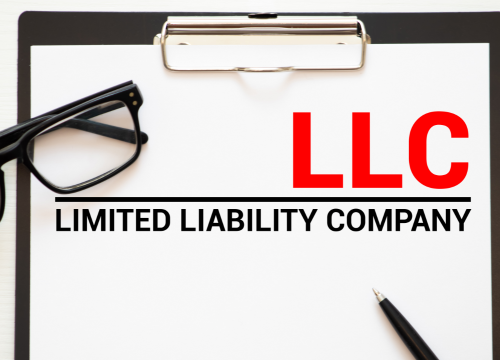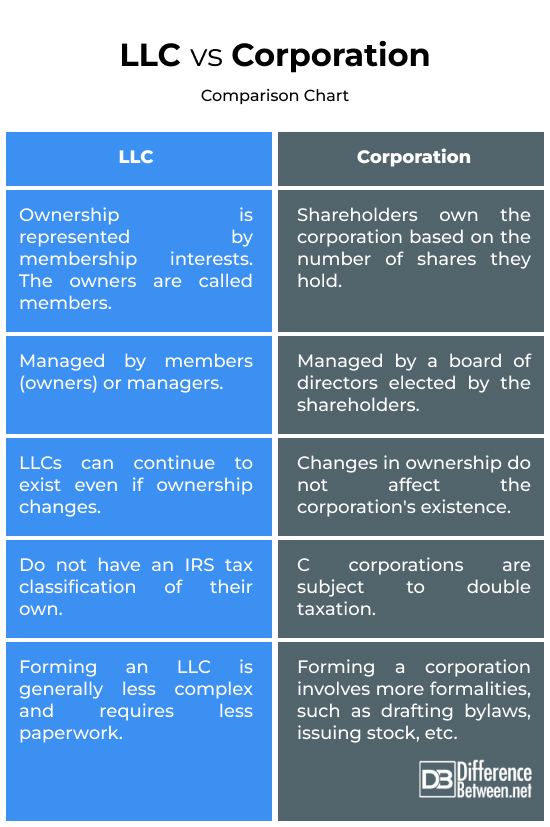Difference Between LLC and Corporation
In the process of beginning a new business, selecting the appropriate firm is one of the first things that you need to accomplish. Corporations and limited liability companies (LLCs) are the two most common company structures that proprietors of companies opt for. People own a limited liability company (LLC), whereas shareholders own a corporation. This is the most significant distinction between the two. A limited liability company (LLC) is a more flexible business structure that is simpler to establish and manage than a corporation.
Each and every kind of business has both positives and negatives as well. The following is a brief outline of the primary distinctions that exist between a limited liability company (LLC) and a company.

What is an LLC?
The limited liability company, sometimes known as an LLC, is a relatively new type of business entity that combines the benefit of limited liability protection offered by a corporation with the adaptability and ease of operation offered by a partnership. Consequently, this indicates that the owners, who are often referred to as members, have limited personal accountability for the activities and debts of the company.
Limited liability companies (LLCs) are permitted by state laws, and the regulations that regulate them might vary from one state to the next. Members of limited liability companies (LLCs) are normally referred to as members.
Anyone, including individuals, corporations, foreigners, foreign entities, and even other limited liability companies, can be a member of a limited liability company (LLC) in many jurisdictions because ownership is not restricted. However, limited liability companies (LLCs) cannot be formed by some businesses, such as banks and insurance companies.
Limited liability companies (LLCs) have the option of avoiding paying federal taxes directly. Instead, the profits and losses are recorded on the owners’ individual tax returns. This is the customary practice. The limited liability company (LLC) also has the option of selecting a different classification, such as a corporation. Creditors may have the authority to prosecute members of a corporation if there is fraud or if the company fails to meet the requirements set forth by the law and the reporting requirements.

What is a Corporation?
It is important to note that a company is a distinct legal entity from its owners, who are also referred to as shareholders. One of the most important characteristics of a corporation is its limited liability, which implies that the personal assets of the shareholders are often shielded from the debts and obligations of the corporation.
Corporations have the ability to raise cash through the sale of shares of stock and can continue to exist indefinitely. Even if the ownership of the company changes, they continue to exist and have the ability to enter into contracts, sue or be sued, and engage in a variety of other legal activities.
There are numerous forms of corporations, such as C corporations and S corporations, and each of these types of corporations presents its own unique set of tax needs and structures.
Difference between LLC and Corporation
Ownership
Ownership in an LLC is represented by membership interests, and individuals or entities holding these interests are referred to as members. LLCs can have a flexible ownership structure.
In a corporation, on the other hand, ownership is represented by shares of stock. Shareholders own the corporation based on the number of shares they hold. Ownership can be easily transferred through buying and selling shares.
Management
An LLC can be managed by their owners (members) or manager(s), with the owners acting more like passive investors. All members can have a say in the decision-making process, and they may appoint one or more managers to handle the daily operations.
Corporations are managed by a board of directors elected by the shareholders. The board appoints CEOs and CFOs to oversee day-to-day operations. Shareholders usually have voting rights in major decisions.
Taxes
LLCs often have pass-through taxation, meaning that the business itself is not taxed. Profits and losses are passed through to the members, who report them on their personal tax returns. However, LLCs can also choose to be taxed as a corporation if it better suits their needs.
C corporations are subject to double taxation, where the corporation is taxed on its profits and shareholders are taxed on any dividends received. S corporations, on the other hand, have pass-through taxation similar to LLCs but with more restrictions on ownership and structure.
Legal Liability
Both LLCs and corporations are classified as limited liability business entities. Members of an LLC enjoy limited liability, which means their personal assets are generally protected from business debts and liabilities.
Shareholders in a corporation also benefit from limited liability. Their personal assets are protected, and their risk is typically limited to the amount invested in the company.
LLC vs. Corporation: Comparison Chart

Summary
There are certain parallels between limited liability companies (LLCs) and corporations; nevertheless, there are also key differences between the two, with each having its own set of benefits and drawbacks. LLCs, in a nutshell, provide a number of benefits, including the opportunity to choose between member and manager management, pass-through taxation, limited liability, and flexible ownership. Corporate entities, on the other hand, offer a number of benefits, including restricted liability, ownership through shares, a hierarchical management structure, the possibility of double taxation (in the case of C companies), and the possibility of double taxation.
FAQs
What is the difference between a corporation and an LLC in Canada?
In Canada, a corporation can be either federal or provincially incorporated, while an LLC equivalent is known as a Limited Liability Partnership (LLP).
What is the Canadian equivalent of an LLC?
The Canadian equivalent of an LLC is a Limited Liability Partnership (LLP).
Is Apple an LLC or a corporation?
Apple is a corporation, specifically a C corporation in the United States.
Can an LLC become a corporation?
Yes, an LLC can elect to be treated as a corporation for tax purposes.
Does CRA recognize LLC?
No, the Canadian Revenue Agency (CRA) does not recognize LLCs; they are treated differently than corporations.
Can a Canadian citizen own an LLC?
Yes, a Canadian citizen can own an LLC, but it would be subject to different tax treatment in Canada.
How is LLC income taxed in Canada?
In Canada, LLCs are regarded as taxable corporations rather than flow-through entities. This implies that the income is attributed to the LLC itself, and the owners are only taxed when the LLC makes cash distribution.
How much tax does an LLC pay in Canada?
In Canada, LLCs are treated as either sole proprietorships or corporations, depending on how they’re structured and operated. So, the amount of tax an LLC pays depends on the type of entity it’s considered to be.
Is an LLC a corporation for Canadian tax purposes?
No, an LLC itself is not automatically considered a corporation for Canadian tax purposes.
- Difference Between Caucus and Primary - June 18, 2024
- Difference Between PPO and POS - May 30, 2024
- Difference Between RFID and NFC - May 28, 2024
Search DifferenceBetween.net :
Leave a Response
References :
[0]Image credit: https://www.canva.com/photos/MAEJU7TzEWM-llc-limited-liability-company-handwriting-on-paper-with-cup-of-coffee-and-pen-acronym-business-concept/
[1]Image credit: https://www.canva.com/photos/MAEEd0nhf8s-corporation-concept/
[2]Edwards, John. “LLC vs. Incorporation: Which Should I Choose?” Investopedia, 13 Nov. 2022, www.investopedia.com/articles/personal-finance/011216/llc-vs-incorporation-inc-which-should-i-choose.asp.
[3]Watts, Rob and Jane Haskins. “LLC Vs. Corporation.” Forbes Advisor, 1 Aug. 2022, www.forbes.com/advisor/business/llc-versus-corporation/.
[4]Fernando, Jason. “What is an LLC? Limited Liability Company Structure and Benefits Defined.” Investopedia, 30 Sept. 2023, www.investopedia.com/terms/l/llc.asp.
[5]Mancuso, Anthony. LLC or Corporation?: Choose the Right Form for Your Business. Nolo, 2020.
[6]Mitchell, Patricia. Choosing the Right Legal Form of Business: The Complete Guide to Becoming a Sole Proprietor, Partnership, LLC, Or Corporation. Atlantic Publishing Company, 2010.
